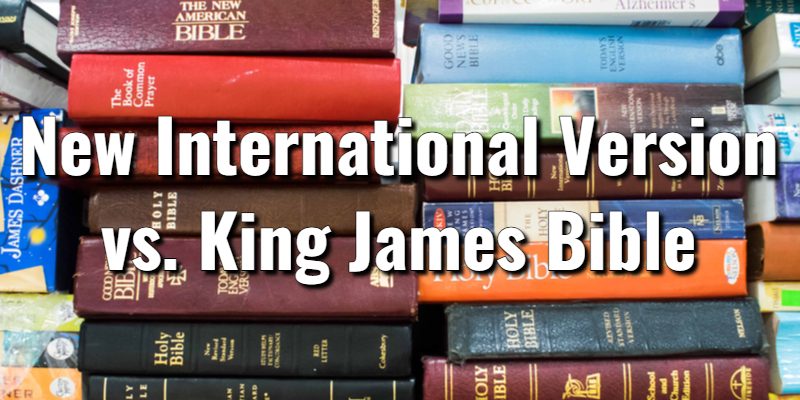This is part of Lord’s Library’s Bible Comparison Series. Our editors explore the New International Version vs. King James Bible so you can understand the major differences between each translation.
 When looking for a new Bible for yourself or as a gift, comparing the different Bible versions is an ideal first step. It’s also important that one considers the various Christian Church denominations when Bible shopping so the reader can be comfortable with their translation’s version of English. Some churches mandate a precise edition as well, while others may be curious about which version of the manuscript their favorite Bible translation comes from.
When looking for a new Bible for yourself or as a gift, comparing the different Bible versions is an ideal first step. It’s also important that one considers the various Christian Church denominations when Bible shopping so the reader can be comfortable with their translation’s version of English. Some churches mandate a precise edition as well, while others may be curious about which version of the manuscript their favorite Bible translation comes from.
.If you’ve ever asked the question “What’s the difference between the New International Version vs. King James Bible?” you’ve come to the right place. It’s in that spirit that our editors compiled this short resource by first offering a simple description of each Bible version, and then a comparison that highlights key contrasts. For each of the two Bible versions compared, Lord’s Library editors included links to our directories of the best editions, as well as the most popular products.
New International Version vs. King James Bible
What is the New International Version (NIV)?
The New International Version was created to meet the need for a Bible in modern English using the earliest, highest-quality manuscripts available. The translators also aimed to create a reading of God’s Word that would be accessible to a wide audience in terms of language. The NIV Bible was translated by a team of 15 biblical scholars representing many different evangelical denominations.
The New International Version was first published complete in 1978 by Biblica, formerly known as the International Bible Society. Later revisions in 1984 and 2011 were created in light of new manuscript discoveries. It has become one of the best-selling modern translations on the market today. Modern criticisms include those who state that the NIV has significantly altered, or downright omitted, key passages that are present in the King James Version and other, older, literal translations.
What is the King James Bible (KJV)?
The King James Version has stood the test of time and proven itself by becoming the best-selling English Bible translation of all time. This is because it boasts incredible accuracy to the manuscripts from which it was translated and a rich, vibrant language. The complete King James Bible was originally published in 1611 after being commissioned by King James VI.
The historical significance of this Bible translation is astounding, so much so that it has been credited with shaping much of the culture of the English-speaking world. Today, the King James Version still proves to be an effective and reliable translation, with its only caveat being that the language it’s written in is not friendly to the average reader.
New International Version vs. King James Bible; What’s the Difference?
The King James Bible is the oldest and best-selling English Bible translation of all time. For multiple centuries the King James Version has proven to be the standard for countless English-speaking peoples. The New International Version made its splash in the world of Bible translations by bringing the Scriptures to an English audience in a more accessible way than ever before. While the Old English stylings of the language present in the King James Bible intimidates many readers, your average person can pick up the NIV Bible with a greater degree of ease.
The King James Bible was translated with a word-for-word philosophy, using the best and most trusted manuscripts of the time. The NIV Bible was created using a philosophy closer to a thought-for-thought approach, seeking to relay the overall message of a passage instead. The NIV used Biblia Hebraica Stuttgartensia as its textual basis for the Old Testament and the UBS Greek for the New Testament.
The King James Bible used the Masoretic Text, Septuagint, and the Vulgate for its Old Testament and the Textus Receptus for its New Testament. Ultimately, both Bibles have proven to be two of the top translations of their respective times, yet created using different eras of the English language and a slightly different translation philosophy.
Lord's Library participates in affiliate programs. We may make a small commission from products purchased through this resource.
- What Does the Bible Say About Discernment? With Key Scriptures - July 19, 2024
- What Does the Bible Say About Disobedience? With Key Scriptures - July 19, 2024
- 1 Timothy 1:12 Meaning: Commentary on an Important Scripture - July 11, 2024














